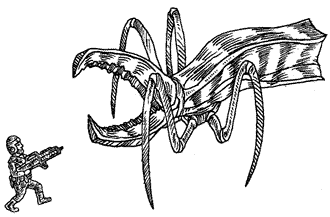Movies

Starship Troopers (Sony Pictures). Based on a 1950s sci-fi novel, this film about an apocalyptic war between human beings and giant bugs renews the debate: Is director Peter Verhoeven (Robocop) a postmodern genius or a purveyor of schlock? Some critics bemoan Starship's grotesque violence and glorification of a "happily fascist world" (Richard Schickel, Time). Others consider it a witty sendup of action movies, with fabulous special effects and campy characters: "a cheerfully lobotomized, always watchable experience" (Kenneth Turan, the Los Angeles Times). (See the official Starship Troopers site.)
The Wings of the Dove (Miramax Films). The latest film adaptation of a Henry James novel wins praise for its fidelity to the text and its period trappings. "The finest Masterpiece Theatre movie ever made," says Owen Gleiberman (Entertainment Weekly). Other plaudits go to period-piece veteran Helena Bonham Carter and to the film's psychological richness. The highbrow critics dissent, arguing that director Iain Softley has flattened the subtleties of James' novel. In the New York Review of Books, Louis Menand deems the film an inferior version of The English Patient. The New Yorker's Daphne Merkin declares James unfilmable. Alex Ross, writing in Slate, disagrees. (Click here for his review and here for the official site.)
Mad City (Warner Bros.). This screed against TV journalism is dismissed as hackneyed, heavy-handed, and hypocritical. A dim laid-off security guard, played by John Travolta, takes hostages at the American Museum of Natural History, while an opportunistic reporter, played by Dustin Hoffman, eggs him on. The New Yorker's Anthony Lane says the movie imitates the medium it critiques, "pumping up the humdrum into the histrionic." The post-Pulp Fiction infatuation with John Travolta ends, with critics carping that he plays every character as a charming lout. (Click here for the official site.)
Theater
Proposals, by Neil Simon (Broadhurst Theatre, New York City). Simon tries to write serious drama, but critics find him as schmaltzy as ever. His play, about the love lives of a '50s Jewish family and its black maid, riffs on race and death. Reviewers take him to task for overworking his trademark Borscht Belt repartee. Cardboard characters and a contrived plot are mere "conduits for the jokes" (Ben Brantley, the New York Times).
Books

The Dark Side of Camelot, by Seymour M. Hersh (Little, Brown & Co.). Denunciations for an ace investigative reporter's exposé of John F. Kennedy. Critics complain that Hersh repackages old accusations--e.g., that JFK dallied with women and the Mafia--in "heavy-handed sensationalism" (Alan Brinkley, Time). They find no evidence for some outlandish claims (e.g., that Kennedy was blackmailed into picking LBJ as his running mate in 1960) and only thin evidence for others (many sources are anonymous, and some named sources claim they were misquoted). Newsweek's Evan Thomas suggests Hersh's zeal for muckraking has "consumed him." (Slate's Jacob Weisberg disagrees in his review of the book.)
Alfred C. Kinsey: A Public/Private Life, by James H. Jones (Norton). The biography exposes the pioneer sexologist as a gay masochist who organized and filmed orgies. Many applaud the book's conclusion that his perversions distort his studies. Others find the book cynical, "simplistic and patronizing" (Richard Rhodes, the New York Times Book Review). They say Kinsey's private life bears no relation to his scholarship, and they question the biography's anonymous sources. The New Republic's Alan Wolfe finds similarities between Jones and Kinsey: Both are voyeurs who exaggerate their subject's sexual activity. (See Thomas Laqueur's review in Slate and read an excerpt from the book.)
Joy of Cooking: The All-Purpose Cookbook (Scribner). The sixth version of the classic cookbook occasions nostalgia for the 1931 original. Praise goes to its new emphasis on convenience--many recipes require just 20 minutes--and its inclusion of such ethnic dishes as tapas and Asian noodles. It is also said to be more accurate and better organized, with fewer chatty digressions. But most critics regret the disappearance of the "quirky personal voice" of the original author, St. Louis society matron Irma S. Rombauer. The book is "no longer a guide to daily life and an antidote to the worries of its era" (Molly O'Neill, the New York Times). (The Joy of Cooking site plugs the book and gives its history.)
Art
"The Warhol Look/Glamour Fashion Style" (Whitney Museum, New York City). An exhibition of the foppish pop artist's ephemera--his clothes, souvenirs, and photos--is panned as unexpectedly boring and blindly reverential of Warhol. Items exemplifying the artist's campy humor (his massive Barbie Doll collection, his teen-age scrapbook of celebrity photos) are said to be scarce. Many of the other articles (such as a Versace dress that uses Warhol's Marilyn Monroe face) never even belonged to the artist and serve only to make tendentious points about art and fashion. Besides, complains New York's Mark Stevens, there are "more dresses on display than paintings." (The Whitney plugs the exhibition.)
Recent "Summary Judgment" columns
Music--Spiceworld, by the Spice Girls;
Museum--P.S. 1 Contemporary Arts Center;
Movie--Red Corner;
Book--Violin, by Anne Rice;
Book--My Brother, by Jamaica Kincaid;
Opera--Xerxes, New York City Opera.
Movie--Gattaca;
Movie--A Life Less Ordinary;
Theater--Triumph of Love;
Book--Speaking Truth to Power, by Anita F. Hill;
Television--Rodgers and Hammerstein's Cinderella (ABC);
Television--Lewis & Clark: The Journey of the Corps of Discovery (PBS);
Music--The Velvet Rope, by Janet Jackson;
Dance--Merce Cunningham: Forward & Reverse (Brooklyn Academy of Music).
Movie--The Devil's Advocate;
Death--James Michener;
Book--Jackie Robinson: A Biography, by Arnold Rampersad;
Theater--Side Show;
Architecture--New Jersey Performing Arts Center (Newark, N.J.);
Fashion--Wearable Computers (Massachusetts Institute of Technology Media Lab);
Music--Psyché, by Cesar Franck (New York Philharmonic).
Movie--Seven Years in Tibet;
Movie--BoogieNights;
Fashion--Versace, Spring/Summer '98 Collections;
Product--Internet Explorer 4.0;
Award--Nobel Prize for Literature, Dario Fo;
Book--How the Mind Works, by Steven Pinker.
--Franklin Foer
